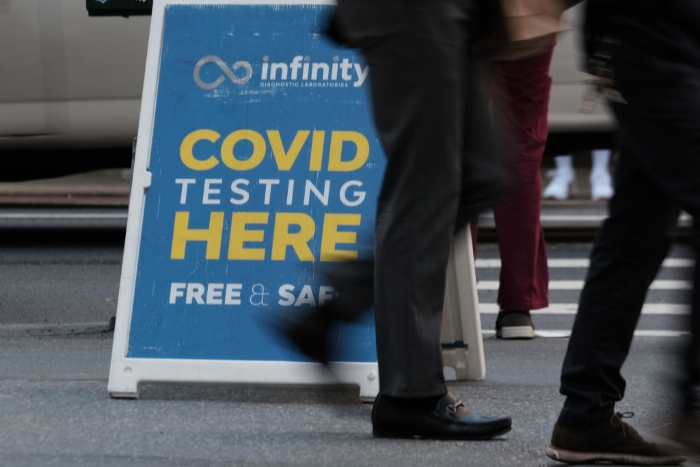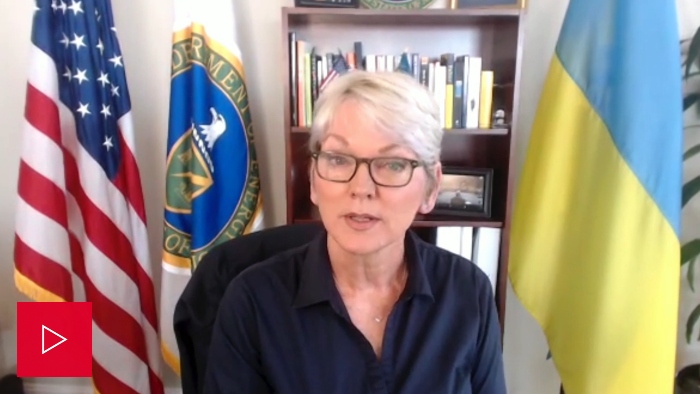| | |  | BY MYAH WARD | With help from Joanne Kenen and Alice Miranda Ollstein
| 
People walk past a Covid testing site in New York City. | Spencer Platt/Getty Images | GENE THERAPY — We all know that person who seems Covid-proof. They’ve been exposed countless times. Their spouse and kids all had Covid, yet they somehow avoided it. Then there are people who have been infected two or three times, sometimes within a span of just a few months. Others are dealing with long Covid months after a mild infection. The lingering questions about why this virus affects people so differently have become more urgent as vaccine immunity wanes, and as Omicron variants cause reinfections that are driving a rise in hospitalizations in the U.S. Global scientists, with expertise in immunology and microbiology, are now turning to human genetics to figure out how a dwindling number of people have managed to avoid infection for more than two years. Nearly 60 percent of Americans have caught the virus, including 3 out of 4 children, according to the CDC. IHME estimates this figure exceeds 75 percent. Genetics doesn’t explain everything about how Covid decides to attack a person. Numerous factors — including vaccination status, age, overall health and lifestyle, where you work, whether you mask regularly — play a role. Even exposure to past coronaviruses, which were first discovered in the 1950s, might explain why some people have immune systems that were better prepared to fight a novel virus, Jagdish Khubchandani, a professor of public health at New Mexico State University, told Nightly. But by studying genes and other biological traits, scientists are trying to better understand why some people might be more resistant to Covid infection, knowledge that could be harnessed to improve vaccines and develop new drugs to fight the disease. In one international study, scientists are screening and studying the genetics of people who believe they are resistant to Covid infection. Researchers are trying to figure out exactly what unique genetic and immune characteristics might make someone more vulnerable — or immune — to Covid. Another, more controversial human-challenge study actually infected healthy, young adults with the virus in a controlled setting. The U.K. study injected 34 adults, ages 18 to 30, with a small dose of the virus. The individuals were kept in quarantine for two weeks in an isolation unit at a hospital in London. In the participants who became infected, the virus replicated rapidly, Nicolas Noulin, director of clinical scientist at hVIVO, and a co-author of the human trial, told Nightly. Other participants never got sick, while other uninfected patients had low levels of the virus for a short period of time, which shows their bodies were actively fighting the virus. Susceptibility to many diseases, including sickle cell anemia and malaria, is related to genetics. Similarly, with Covid, “there’s something about our genetic structure where we have an over-expression or a deficiency of some kind of protein or enzyme through a gene that makes us vulnerable or protects us,” Khubchandani said, though scientists have more studies to do before they figure out what these genetic differences might be, and what they mean. One theory is that your DNA could affect how your immune system reacts to the virus or determine if you have fewer receptors in your nose, throat and lungs for the virus to latch on to, Noulin said. Some people just “fit” the virus better. “The virus is like a key and a lock, so if you have a key and a lock, then you have a match,” he said. “If the key is not perfectly fitted to the lock, you may still be able to attach but it will not be as efficient as an effective match.” Answering these questions is complicated because so many factors are at play, Khubchandani said, and the studies aren’t easy to conduct. Finding people to actually participate in such a trial is challenging, as is tracking down people who truly were never infected with Covid, not just those who had an asymptomatic infection and didn’t know it. Welcome to POLITICO Nightly. Reach out with news, tips and ideas at nightly@politico.com. Or contact tonight’s author at mward@politico.com, or on Twitter at @MyahWard.
| |
| | DON'T MISS DIGITAL FUTURE DAILY - OUR TECHNOLOGY NEWSLETTER, RE-IMAGINED: Technology is always evolving, and our new tech-obsessed newsletter is too! Digital Future Daily unlocks the most important stories determining the future of technology, from Washington to Silicon Valley and innovation power centers around the world. Readers get an in-depth look at how the next wave of tech will reshape civic and political life, including activism, fundraising, lobbying and legislating. Go inside the minds of the biggest tech players, policymakers and regulators to learn how their decisions affect our lives. Don't miss out, subscribe today. | | | | | | | THE PILL AFTER DOBBS — Joanne Kenen and Alice Miranda Ollstein email Nightly: The Birth Control Pill, once a symbol of women’s sexual and reproductive autonomy, remains one of the most popular methods of contraception, even though people have a lot more choices than they did when the pill became available in the early 1960s. The Pill itself has changed in the intervening six decades; it now contains lower doses of hormones and is safer. But how and where women obtain the Pill is changing — and may change more given that reproductive health landscape is expected to look very different when the Supreme Court rules in the Mississippi case that is likely to end or at least severely restrict the abortion rights protected by Roe v Wade in 1973. Here are five scenarios for the future of the Pill after Roe: — The Status Quo . Even as the rest of the reproductive health landscape changes, it’s possible that access to the Pill could be more or less the same. Right now, doctors or other health care providers like physician assistants or nurse practitioners can prescribe birth control pills (including via telemedicine and apps). The pill is covered by health insurance at no cost under Obamacare (though not every health plan covers every brand.) — Pharmacy Prescriptions. At least 17 states plus Washington, D.C., already allow pharmacists to prescribe the Pill, although some are still putting those rules into effect, said Elizabeth Nash, who tracks state reproductive health policy for the Guttmacher Institute, which supports abortion rights. But it’s not clear how widely known this option is, or how many pharmacists have been trained. As Nash noted, pharmacies have signs all over the place about flu and shingles shots, but she’s yet to see one saying, “Get your birth control pills here!” — Primary Care. Advocates have long pushed for making the Pill and other contraceptive methods a greater part of routine primary care, and routine care right after childbirth. They say that if a patient of child-bearing age goes to see a primary care provider — for any reason — family planning should be addressed, and the patient who wants it should be able to walk out of the office that very day with a prescription in hand (or a device implanted, injected, or inserted). Primary care needs to be “more proactive,” said Mark Edwards, co-founder of Upstream USA, a nonprofit that has begun working in several states to train providers in primary care settings to counsel and provide patients with the Pill or other method of their choice. — Over the Counter. A campaign is underway to make the Pill an over-the-counter drug that doesn’t require a prescription (and it could then be purchased online too, so people wouldn’t have to deal with pharmacists who oppose it for all or some of their customers.) “I hear about so many barriers young people in particular face when a prescription is required — from long wait times for appointments to health care providers refusing to prescribe birth control because of their religious or moral beliefs,” said Angela Maske, who manages the #FreeThePill Youth Council. Several other former prescription drugs have moved over the counter in recent years, including some common painkillers and allergy meds, and more than 100 other countries sell birth control pills without a prescription, including South Korea and the U.K. The FDA still needs to sign off on safety grounds. (The Pill is now very low risk, but like other medicines it’s not zero risk.) It’s also not clear how the Affordable Care Act insurance coverage requirement would play out as the law currently covers prescribed methods of contraception. “There is a move to get it out of the clinical setting,” said Alina Salganicoff, who directs the women’s health policy program at the Kaiser Family Foundation. But there are questions including that if it’s OTC, “How do you get Medicaid or private insurance to pay for it?” — Restricted access in a post-Roe world. Some conservatives have raised the possibility of restricting certain contraceptives but how far and how fast this push would go and whether it would affect the Pill is speculation at this point. Emergency contraception — sometimes referred to as a “morning after” pill — which is a misnomer given that most brands work for at least three and up to five days — is a more likely initial target for reduced access or outright bans. Some abortion opponents perceive emergency contraception (which can also include one type of IUD) as a form of early abortion. But the American College of Obstetricians and Gynecologists and other medical groups say that emergency contraception can prevent pregnancy in several ways, including by blocking ovulation. But it does not terminate a pregnancy. If you want to know more, Joanne and Alice wrote more about contraception access and policy in POLITICO Magazine the other day.
| | — Biden invokes Defense Production Act to increase supply of U.S. infant formula: President Joe Biden announced today that he was invoking the Defense Production Act to speed up the manufacturing of U.S.-made infant formula, as well as directing government agencies to use the Defense Department’s commercial aircraft to pick up products from overseas. The DPA requires suppliers to send necessary resources to infant formula suppliers before other customers who have requested the goods. — Biden resists Ukrainian demands for long-range rocket launchers: Ukrainian officials are growing frustrated with the Biden administration’s resistance to providing U.S.-made long-range rocket systems , a weapon Kyiv says is critical to outgunning Russia in the heavy artillery duels raging across the Donbas. Officials across the Ukrainian government have pleaded with the U.S. for months to send the Multiple Launch Rocket System, or MLRS. But three people familiar with the issue say the Ukrainians are concerned that the White House is holding back over worries the weapon could be used to launch strikes inside Russia, thereby expanding and prolonging the conflict. — U.S. reopens embassy in Ukrainian capital: The United States has reopened its embassy in Ukraine’s capital, three months after fears of what became a brutal Russian invasion prompted its closure. The decision to send a small contingent of U.S. diplomats back to Kyiv as part of a soft reopening of the embassy is intended to signal that the United States stands with Ukraine against Russia. It is a move U.S. lawmakers from both parties, as well as Ukrainians, have been hoping to see for weeks. But Biden administration officials had hesitated, in large part due to ongoing security concerns, even as other countries reopened their missions. — Trump pushes Oz to declare victory in undecided Pennsylvania primary: Former President Donald Trump said today Mehmet Oz should declare victory over opponent Dave McCormick in the too-close-to-call Pennsylvania GOP battle for Senate nomination — reprising his conspiratorial playbook from the 2020 presidential election that led to the deadly Jan. 6 insurrection at the Capitol. “Dr. Oz should declare victory. It makes it much harder for them to cheat with the ballots that they ‘just happened to find,’” Trump said on Truth Social, the social media platform that he helped found. — Sweden, Finland submit applications to join NATO: Sweden and Finland formally applied to join NATO today at the military alliance’s headquarters in Brussels. There is already broad support for the countries’ membership , and militaries in both Finland and Sweden already cooperate closely with NATO allies. But the formal ratification of Helsinki and Stockholm’s accession is expected to take months, requiring approval from all 30 members.
| 
| — Granholm ‘bullish’ on Congress passing clean energy tax credits: Energy Secretary Jennifer Granholm said today she is “bullish” that Congress will ultimately pass some form of clean energy tax credits — particularly as moderate Democrat Joe Manchin conducts bipartisan meetings with senators on an energy bill. The bipartisan infrastructure law that passed last year “is sort of the spine of the president’s clean energy and energy future agenda, but the tax credits are the lungs of it,” Granholm told POLITICO’s Sustainability Summit. “They absolutely need to pass and I am feeling actually pretty bullish about it at this very moment.” — Health Secretary Xavier Becerra tests positive for Covid-19: Becerra tested positive this morning ahead of a meeting with other health ministers , spokesperson Sarah Lovenheim said in a statement. “He is fully vaccinated and boosted against COVID-19, and is experiencing mild symptoms,” she said. Lovenheim added that Becerra last saw Biden on Thursday. “Biden is not considered a close contact” as defined by the Centers for Disease Control and Prevention, she said.
| | DEFAULT POSITION? Washington is willing to let a provision allowing Russia to make bond payments expire , U.S. Treasury Secretary Janet Yellen announced today — a move that increases the chance Moscow will default on its foreign debt, Paola Tamma writes. The clause, which falls under the U.S. sanctions regime, has allowed Russia to service its foreign debt so far with the approval of the U.S. Treasury’s Office of Foreign Assets Control. It’s set to expire on May 25. “The expectation was for it to be time limited. It’s reasonably likely to expect that the license will be left to expire,” Yellen said, speaking to reporters in Bonn, Germany, ahead of a G7 finance ministerial meeting. “A final decision hasn’t been taken yet, but I think it’s unlikely that it would continue.” Yellen also addressed the question of what the West can do about Russian oil exports — the subject of intense debate right now in the EU, which wants to include oil in its next sanctions package but has so far been stymied by Hungary's resistance. One approach, Yellen said, is to impose a tariff or price cap on Russian oil exports. “Oil and gas revenues are very substantial source of revenues for Russia,” she said. “We would like to do what we could to diminish those revenues.”
| |
| | STEP INSIDE THE WEST WING: What's really happening in West Wing offices? Find out who's up, who's down, and who really has the president’s ear in our West Wing Playbook newsletter, the insider's guide to the Biden White House and Cabinet. For buzzy nuggets and details that you won't find anywhere else, subscribe today. | | | | | | | | |
Half a percentage point The margin under which Pennsylvania law requires an automatic statewide election recount if the top two candidates in a race are within half a percentage point of each other, which Oz and McCormick currently are. |
| | | | 
More than 4,000 pallets of New York-made hand sanitizer, called NYS Clean, totaling more than 700,000 gallons sit on an old runway at the State Preparedness Training Center in Oriskany, just outside Utica in Central New York. | Joseph Spector/POLITICO | CAN’T WASH YOUR HANDS OF THIS — In the first days of the Covid-19 pandemic, then-Gov. Andrew Cuomo announced New York would use prison labor to address a hand sanitizer shortage and make bottles that were superior to “products now on the market.” New York made so much of the “NYS Clean” hand sanitizer — a whopping 11 million bottles, to be exact — that it still doesn’t know how to get rid of it, Joseph Spector writes. On a former airport runway in Central New York sit 706,172 gallons of NYS Clean, in an array of bottle sizes, on 4,000 pallets that stretch the length of three football fields — out in the open, covered in tarps and likely never to be used, much of it already expired. It will likely cost New York millions of dollars to dispose of it, possibly shipped out of state in hundreds of trucks to be incinerated, according to environmental experts and officials familiar with the process. “There is a way to properly dispose of it,” said Diana Aga, the director of the RENEW Institute at the University of Buffalo, which studies environmental issues. “The issue here is the volume.” Did someone forward this email to you? Sign up here. | |
|
| | Follow us on Twitter | | | FOLLOW US | | |
| |

No comments:
Post a Comment
Note: Only a member of this blog may post a comment.